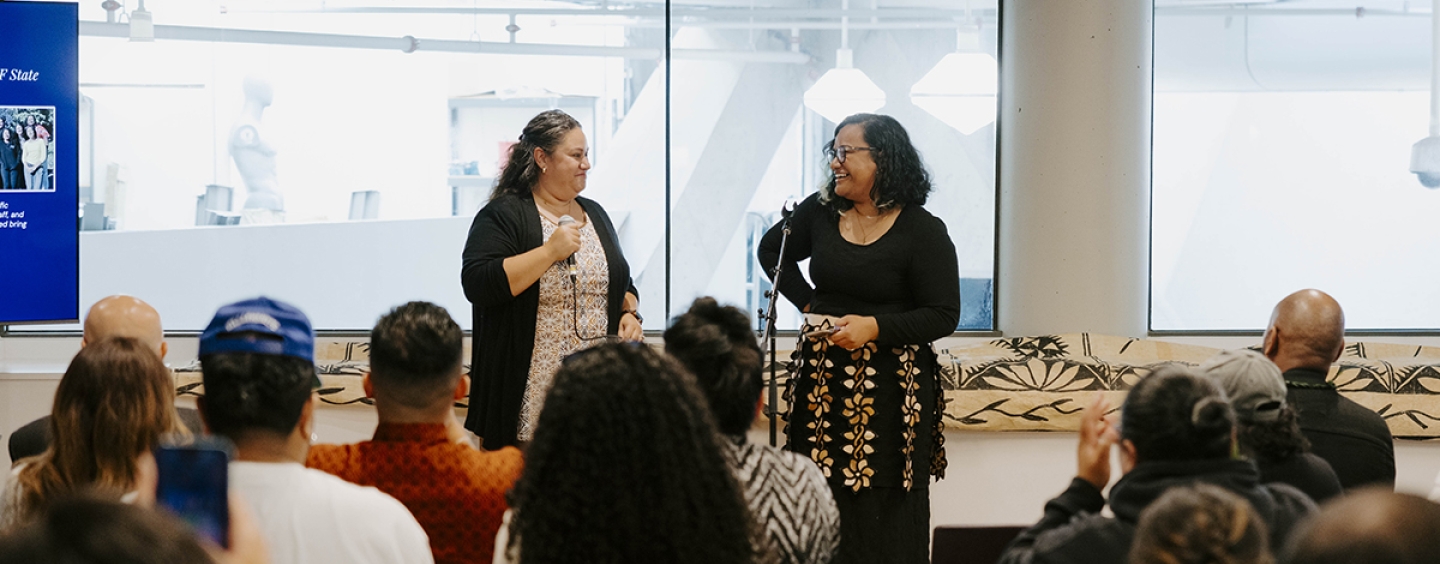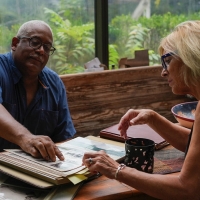SFSU celebrates new Pacific Islander student support program with launch event

SFSU community members and speakers gathered in the Cesar Chavez Student Center to celebrate the launch of the Oceania Scholars Program.
The Oceania Scholars Program focuses on belonging, retention, graduation and success of Pacific Islander students
The San Francisco State University campus community gathered today to celebrate the launch of the Oceania Scholars Program (OSP), a new Pacific Islander student support program. Launched this semester, the program focuses on the belonging, retention, graduation and success of Pacific Islander students at San Francisco State.
OSP is a collaboration between the Critical Pacific Islands and Oceania Studies minor program, housed in the Race and Resistance Studies department and Asian American & Pacific Islander Student Services under the Division of Equity & Community Inclusion. The program was established after the two campus units collaborated to apply for a one-time $460,000 grant awarded by the California State University’s Chancellor’s Office.
“This is a vital new initiative aimed at centering the experiences of Pacific Islander students on our campus,” said SFSU Assistant Professor of Race and Resistance Studies Ponipate Rokolekutu, who is the lead principal investigator for this grant. “This program is more than just an academic initiative. It is a space where culture, identity and community come together to uplift our students and provide them with the tools and support they need to thrive.”
OSP is vital in addressing education equity for Pacific Islander students. It provides tailored support to help students overcome cultural and socioeconomic challenges and to enhance the inclusivity and visibility of Pacific Islander heritage and history on campus.
How OSP works
OSP establishes a central hub on campus where all students, particularly those from Pacific Islander communities, can visit to receive various student support services. That includes student success advising, social and emotional support, culturally relevant resources, campus resources and referrals, leadership development and more. The hub is currently in the Asian American and Pacific Islander Student Services office (Village C at Centennial Square, Room 141) but the goal is to eventually establish a permanent space.
Another important element of OSP is improving how Pacific Islander student data is gathered, maintained and analyzed to better serve this population. Pacific Islanders and Asian Americans are often grouped together in the U.S. For example, the term Asian American & Pacific Islander (AA&PI) is often used to describe the experiences of people from both populations. However, many scholars including OSP collaborators believe this coupling leads to inaccurate data collection that doesn’t accurately represent Pacific Islanders.
“The term Asian American & Pacific Islander can conceal the experiences and narratives of Pacific Islander students. Pacific Islanders are not a monolith, and Asian Americans are not a monolith,” SFSU Asian American and Pacific Islander Student Services Director Jeremy Khuth said. “Such broad terminology fails to account for the unique needs of each community, which is critical in providing targeted support for access and success in higher education and addressing belonging and equity.”
Also, many Pacific Islanders at SFSU identify as mixed-race, Rokolekutu explained. OSP aims to ensure students who identify as Pacific Islander and another race are captured accurately in Pacific Islander student data. The program also focuses on advocating for Pacific Islanders to be recognized as an underrepresented minority (URM).
“Disaggregation of data is essential for distinguishing the unique educational experiences and challenges faced by Pacific Islander students within the broader AANHPI umbrella,” Rokolekutu said. “This enables a more precise identification of their distinct needs, which is crucial for establishing their classification as a URM and advocating for the targeted resources and institutional support required to enhance their academic success, retention and engagement.”
OSP has also created leadership opportunities through five Navigator Student Assistant positions. These positions will allow students to conduct community outreach, organize events, give presentations and more regarding topics and resources geared toward Pacific Islander students.
“The Pacific Islander population is one of the fastest growing here in the United States, so we need the resources to be able to support the growing population of students that are entering higher education,” said Oceania Scholars Program Coordinator Tupou Latukefu, whose position is funded through the grant. "We are finally getting support on an institutional level but historically a lot of the work that has brought forth these new programs and resources have been fought for by Pacific Islander students.”
Tags



